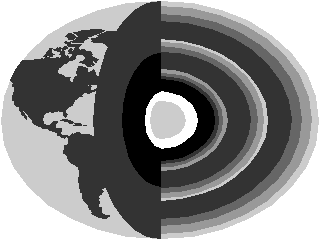
"The result, therefore, of this physical inquiry is, that we find no vestige of a beginning -- no prospect of an end."
-- Scottish geologist James Hutton, The Theory of the Earth, 1795
Like most kids, I went through a phase of being fascinated by dinosaurs. Unlike most kids, I never grew out of it. I've been interested in fossils all my life. So I've accumulated a very large collection of books about fossils of all kinds. Along with them, I've also collected many books about the "earth sciences" in general -- that group of sciences that focus on the study of the Earth in all its many faces and aspects.
- I begin this section of my library with several shelves full of books about geology in general, and some more detailed books about specific sub-fields of geology.
- Most people are not directly affected by geology... unless they live in volcano or earthquake country. Volcanoes and earthquakes are related phenomena that are deeply fascinating in themselves, so I have an entire section devoted just to them.
- Next come a few books that survey the whole history of life on Earth. They're all good for a general overview, but obviously, with such a huge subject area they can't be very detailed.
- Now we get to the heart of the matter: fossils! The first group of these contains books that deal with the oldest part of Earth's history: the Paleozoic Era. Also here are a few books about the almost-unimaginable stretch of time before the Paleozoic, when Earth was prebiotic or inhabited only by micro-organisms that left little evidence of their existence.
- Next is the Mesozoic Era, the era of "middle life," when dinosaurs roamed and ruled the Earth. Look here for books about these lords of creation, and about the other animals with which they shared the planet.
- The Cenozoic Era is the time period since the dinosaurs vanished, when mammals control the land and birds rule the skies.
- Ten million years ago a lineage of great apes began to evolve in the direction of increased brain power and bipedal posture. These increasingly unusual animals bcame our own ancestors, and eventually us. The study of Man and his forebears is known as paleoanthropology.